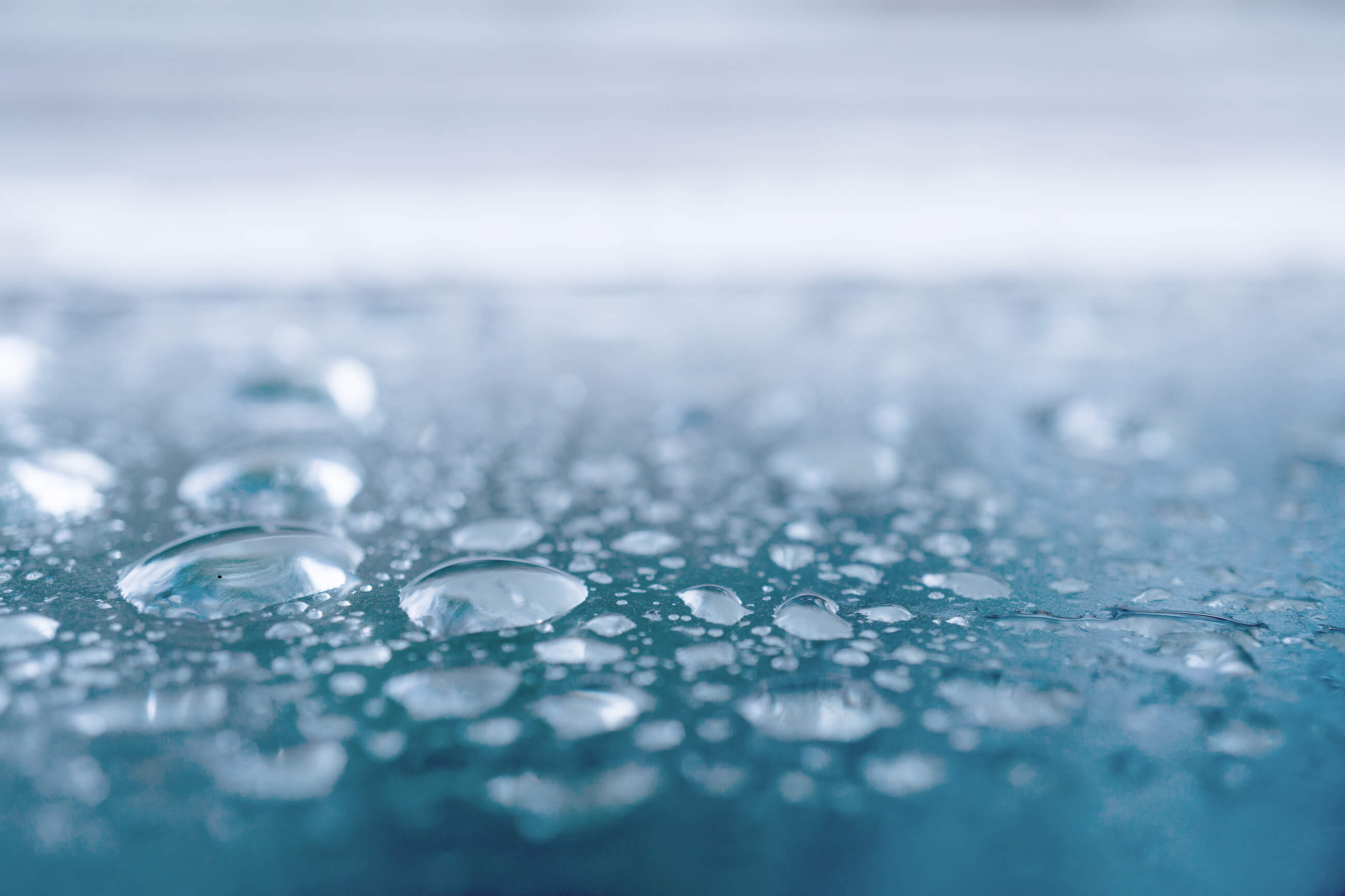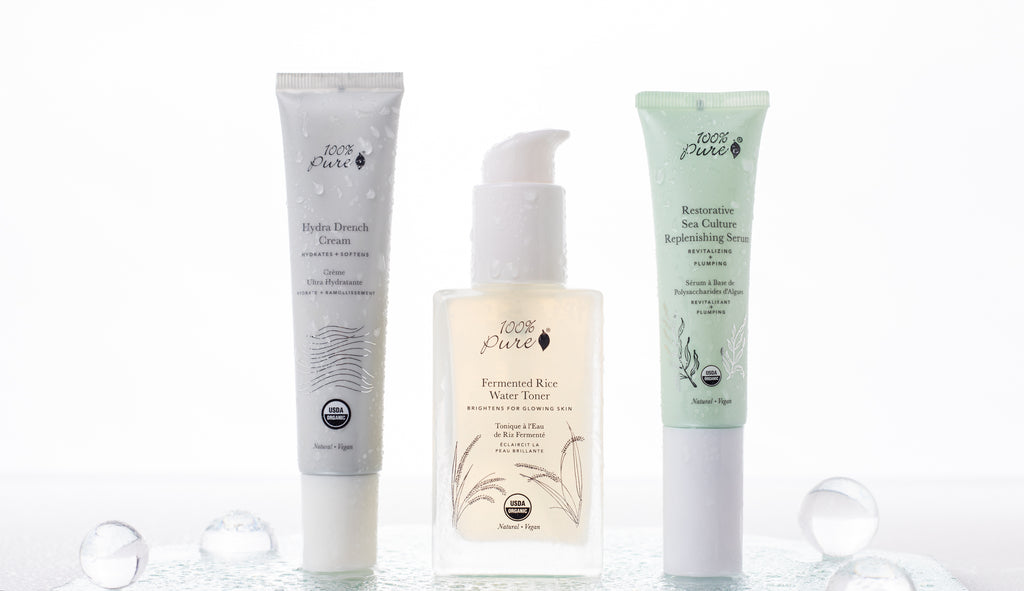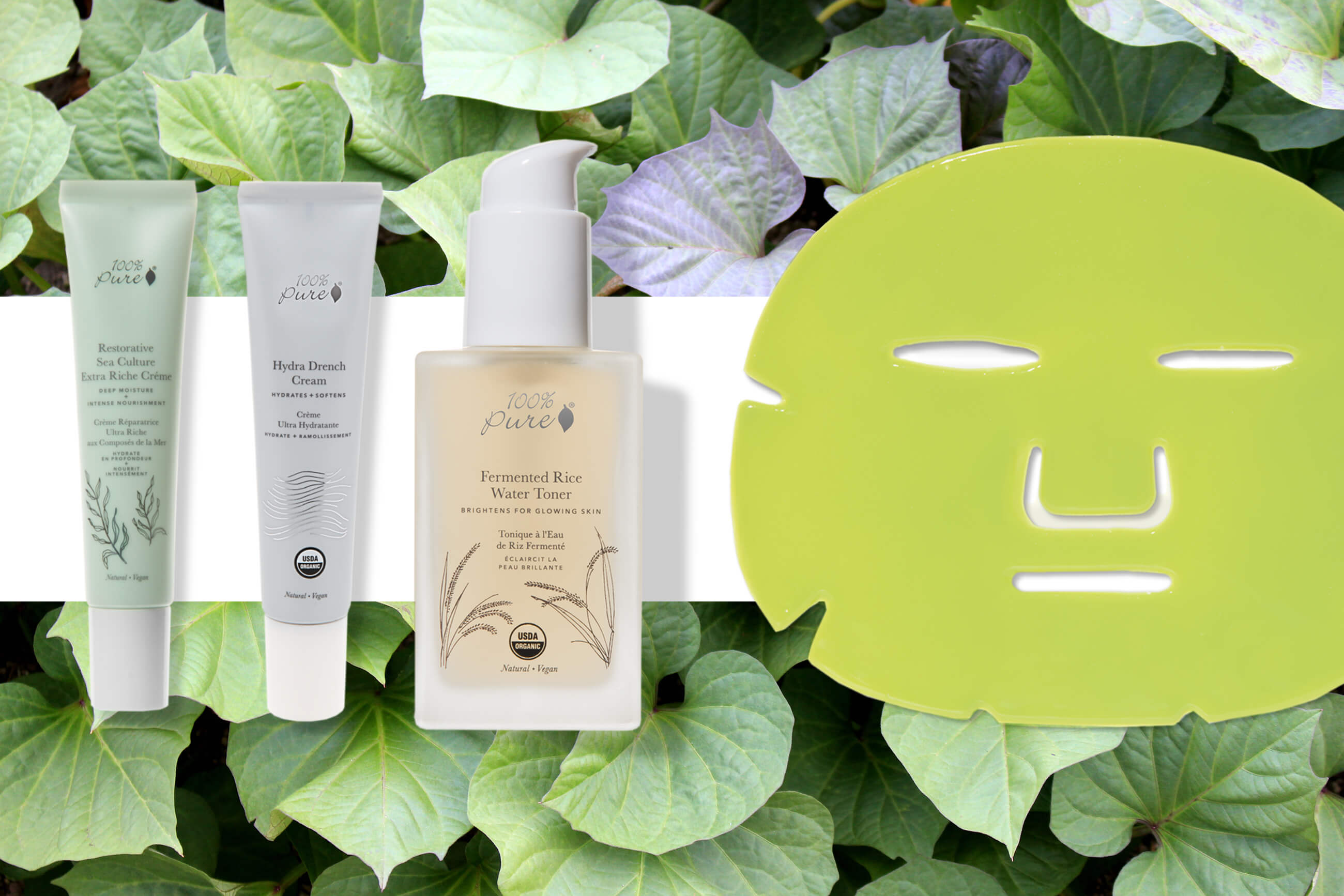How to use hyaluronic acid for skin, and other must-know facts about this hydrating skincare gem
Written by: 100% PURE®
What’s hyaluronic acid, and why has it been such a skincare craze? It’s typically known for its ultra-hydrating and plumping properties for your skin to promote a firmer complexion. But we’ve also harnessed natural sources of hyaluronic acid to create another important function that brings your skincare game to a whole new level.
Keep on reading to find out how hyaluronic acid benefits your skin and the best formulas for a radiant, more youthful complexion so you can skyrocket your daily routine to superstar status in the craze skincare universe!
Hyaluronic acid is a sugar molecule that’s actually already found in our bodies. It keeps our cells hydrated, lubricates joints, and repairs our body. What’s more, hyaluronic acid has been touted as the “key molecule involved in skin moisture.” Because of how it can bind to water, hyaluronic acid is crucial to keeping skin hydrated and youthful.
This hydration hero is even touted as being able to hold up to 1,000 times its weight in water! And once it delivers hydration to your skin cells, it also helps lock in the precious H2O. When your skin is hydrated, it’s more likely to look plump and smooth. Hydration is also important to keep your skin looking its radiant best. And since we tend to become drier as we age – exacerbating signs of aging – hydration is crucial for a more youthful complexion.
Hyaluronic acid is important for wound healing, tissue repair and the overall healthy functioning of all your skin cells. That means it helps your body retain collagen (an essential protein for firm skin), elasticity, and moisture in your skin. With the addition of free radicals and UV damage, a skincare regimen that supports hydration is essential. That’s where hyaluronic acid can make a huge difference!
Why do hyaluronic acid’s benefits enjoy such celebrity status? It’s because hydration is key to plumper, smoother, and more radiant skin. As we age, our hyaluronic acid levels - similarly with our collagen production - begin to dip down, making it harder for our skin to retain moisture. No wonder we start noticing dry patches, fine lines and wrinkles.
Combined with the damaging effects of free radical damage from UV rays and environmental pollutants, our skin really needs a helping hand. That’s when adding hyaluronic acid to your skincare routine can go a long way. We like to call hyaluronic acid “skin care’s little miracle” because it’s effective for all skin types, and easy to apply to your skin daily with a skin hydrating and plumping natural toner. But hyaluronic acid’s hydration powers go farther than just that!
Hyaluronic acid’s benefits go beyond intensive hydration. Most commonly, conventional skincare companies use polymers like silicone to help deliver active ingredients deep into the skin. That sounds great and all, but unfortunately these polymers can be likened to liquid plastic that may accumulate in the body and cause harm.
Moreover, silicones have disadvantages in skincare. These synthetic ingredients prevent moisture from getting into your skin which can affect your skin’s pH level and its barrier. This can dry out your skin and cause your complexion to be dull. When your skin is dehydrated, it can exasperate the signs of aging, such as fine lines, wrinkles, flakiness, and dullness. Silicones also slows down the process of new cells to come to the surface. When dead skin cells build up, it can cause breakouts and clogged pores.
Fortunately, we have your back! Instead of using polymers, we developed a way to use hyaluronic acid as a vehicle for delivering active ingredients deep into your skin cells. We accomplish that by using tiny, different sizes of hyaluronic acid to act as magnets towards your skin cells and force penetration of hydration and nutrients. Hyaluronic acid isn’t just carrying hydration into your thirsty skin cells; it’s also sending nutrients deep into your skin tissue. That’s a double wow whammy for ultimate skin nourishing.

Hyaluronic acid is packed with benefits for different skin types, from oily skin to aging skin. If you’re wondering what this hard-working ingredient could do to solve your skin woes, keep reading to discover the benefits of hyaluronic acid by skin type!
Hyaluronic acid for oily skin and acne-prone skin:
The American Academy of Dermatology recommends hyaluronic acid as a moisturizer for acne-prone and oily skin types. The reason is simple: hyaluronic acid helps your skin to retain moisture and heal inflammation without clogging overactive pores.
While harsh chemicals that are sometimes used to treat acne can strip your skin of its defensive barrier — leaving you prone to acne-causing inflammation — hyaluronic acid helps to bolster your lipid barrier, protecting your skin against irritants. It can be tricky to find the right, non-comedogenic moisturizer for acne-prone and oily skin, but a product with hyaluronic acid is a great place to start.
Hyaluronic acid for mature skin:
Research supports the idea that hyaluronic acid can help to counter some of the signs of skin aging that encroach upon us as we get older. The natural levels of hyaluronic acid in our skin decrease as we age, leading to decreased elasticity and softness, and the formation of fine lines and wrinkles.
By boosting your skin’s hyaluronic acid levels with the right product, you can help to restore some of that suppleness and elasticity, and minimize the appearance of fine lines and wrinkles. Hyaluronic acid can also help to plump your skin, making it appear more radiant and youthful.
Hyaluronic acid for dry skin:
Studies have shown that hyaluronic acid serums can be more effective than conventional moisturizers when it comes to treating dry skin. Hyaluronic acid benefits dry skin by deeply delivering hydration, and helping your skin to retain that hydration over time. This makes this hydration hero an excellent, long-term solution to dry skin.
The right hyaluronic acid serum can be even more beneficial when you follow up with a night cream like our Retinol Restorative Overnight Balm. It’ll help to restore brightness and glow to complexions that have been dulled by dryness, and will also help to ease the redness and itchiness associated with dry skin.
Hyaluronic acid for sensitive skin:
Due to its gentleness, hyaluronic acid is also suitable for use on most sensitive skin types. It can even benefit sensitive skin by helping to boost its natural lipid barrier, defending it from irritants. Even allergy-prone skin may benefit from hyaluronic acid, which could help it to defend itself against environmental stressors. We always recommend doing a patch test on your skin before using any new product on your face, especially if you have sensitive skin!
Hyaluronic acid is a multi-dynamic skincare ingredient that can benefit almost any skin type, and can be found in an array of different products. At 100% PURE, we love to include hyaluronic acid in serums, masks, and moisturizers — products in which hyaluronic acid can achieve its full, moisture-enhancing potential.
Newsletter Subscribe
for more blog updates and exclusive discounts

We firmly believe that Mother Nature is the best teacher and nurturers, and there’s proof in that we source our hyaluronic acid from Japanese sweet potatoes. Another natural source of hyaluronic acid? Seaweed collagen (no wonder Ariel enjoyed such luscious locks!). We’ve deep dived into the benefits of seaweed for your skin, which include nutrient-rich sea minerals, antioxidants, amino acids, vitamins, and other beneficial trace elements for a healthier, softer complexion.
Hyaluronic acid is what makes seaweed collagen a viable alternative to its animal counterpart, type I collagen, which is synthesized from the bones and skin of animals - no thank you! Hyaluronic acid boasts all the same properties as animal collagen, plus it has lower rates of allergic reaction, a better rate of absorption, and is cruelty free. Chase your glowing goddess dreams, starting with our Restorative Sea Culture Replenishing Serum, and working your way up in our collection of other sea-worthy skincare gems!
An easy way to enjoy hyaluronic acid benefits daily is to use a natural toner. For example, hyaluronic acid is a star in the Fermented Rice Toner that’s also rich in enzymes, amino acids, and vitamins to intensely nourish your skin.
Need a refresher on why toners are so important in your skincare routine? They prep your skin so that it can absorb the thicker formulas in the rest of your skincare routine (especially important if you’re following a 10 step Korean skin care routine!). That’s why we packed our toner with hyaluronic acid. We believe in working smarter with natural ingredients to deliver maximum results for your skin.

After toning your skin, the most pampering way to reap hyaluronic acid benefits is to use a natural hydrogel mask that includes a hefty amount of it. The Green Tea Water Bomb Mask packs a powerful hydrating punch. Lie back and relax as the nourishing liquids are sucked into your skin, leaving you with a glowing, plumper complexion.
To help seal in the nourishing ingredients you’ve just applied, end with the Hydra Drench Cream. The hyaluronic acid in it ensures that you reap the full benefits of the other naturally hydrating superstars rose water, chia gel, and nopal cactus in the formula. Of course, after pumping your skin with so much of good ol’ H2O and nutrients, you need some moisturizing to keep all those skincare gems locked in place where they belong - your precious skin cells. Hyaluronic acid preps your skin for the moisturization process - the optimal absorption of omega fatty acids in chia, coconut oil, and skin softening shea butter that provide the final seal to lock your lineup of H2O packed products into dry skin.
Is pure hyaluronic acid serum suitable for all skin types?
Hyaluronic acid is a multi-dynamic skincare ingredient that can benefit almost any skin type, and can be found in an array of different products. At 100% PURE, we love to include hyaluronic acid in serums, masks, and moisturizers — products in which hyaluronic acid can achieve its full, moisture-enhancing potential.
How does pure hyaluronic acid serum promote a healthy and youthful complexion?
Hyaluronic acid is present in the outer layers of the skin, helping to protect it from environmental and UV damage and maintain its elasticity. It also promotes collagen production, boosting skin firmness and elasticity, which is also an important part of lessening wrinkles and fine lines.
Are there any potential side effects or risks associated with using pure hyaluronic acid serum?
Research shows that hyaluronic acid is safe to use. Reactions or adverse effects from hyaluronic acid are rare. If you’re nursing or pregnant, consult your doctor first just to be sure it’s safe for you.
What is the recommended frequency of applying pure hyaluronic acid serum for optimal results?
While some skincare ingredients, like retinol, are best used at night and others, like vitamin C, work their magic in the daytime, hyaluronic acid can be used both morning and night. Depending on your skincare needs and type, you’re able to experience the great benefits of hyaluronic acid twice a day,
Can pure hyaluronic acid serum be used in combination with other skincare products?
Yes! It can be used with most skincare ingredients, except retinols and powerful hydroxy acids.
To sum up, there are plenty of hydrating and nourishing skincare products that inject your pores with much needed hyaluronic acid, which then helps pull the rest of the nutrient-rich ingredients deep into your skin tissue. Hyaluronic acid benefits go far beyond just hydration. It’s a matter of getting the most out of your products for the radiant, plump complexion you’ve always dreamed about. With natural skin care, you can literally flood your routine (and your thirsty skin cells) with hyaluronic acid - a true skincare gem.
We carefully hand-select products based on strict purity standards, and only recommend products we feel meet this criteria. 100% PURE™ may earn a small commission for products purchased through affiliate links.
The information in this article is for educational use, and not intended to substitute professional medical advice, diagnosis, or treatment and should not be used as such.

